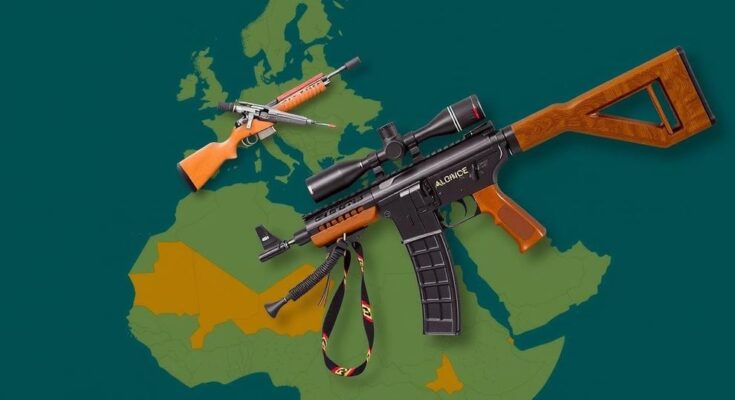The Karamoja region in northeastern Uganda faces severe conflict fueled by small arms proliferation among pastoralist communities. Disarmament initiatives have been implemented since 2000, yielding mixed results due to cross-border challenges. Recent operations highlight ongoing issues with illegal firearms. Leaders from Uganda and Kenya agree on the need for simultaneous disarmament and infrastructure improvements to achieve peace and stability in the region.
The Karamoja region in northeastern Uganda has a long history of violence and insecurity, primarily fueled by poverty and inadequate infrastructure. This conflict is exacerbated by the proliferation of small arms and light weapons, creating a deadly triangle of violence between the Karamojong in Uganda, the Turkana in Kenya, and the Didinga and Toposa communities in South Sudan. In response to the escalating tensions, the Ugandan government launched military-led disarmament initiatives in 2000, which have had limited success due to cross-border challenges and nomadic lifestyles. For instance, in April 2023, Ugandan security forces apprehended 32 Turkana herders, seizing numerous illegal firearms and ammunition, underscoring the persistent issue of arms trafficking across the triangle. Efforts towards disarmament have included joint security operations and community engagement, such as the Operation Maliza Uhalifu in Kenya, which seeks to stabilize the border regions. Moreover, discussions between regional leaders have emphasized the importance of simultaneous disarmament efforts across the affected communities. Despite the challenges, there is a consensus on the necessity for improved laws and awareness on disarmament to facilitate peaceful coexistence among the pastoralists. Uganda’s commitment includes innovative measures such as a fingerprinting system for firearm registration, reflecting an acknowledgment of the complexities involved. The leaders from the region have agreed to enhance cooperation in managing arms proliferation and promoting development initiatives to address the underlying sources of conflict. “North Eastern Uganda especially Karamoja is a peaceful region and any genuine herder must not cross the border while armed, as you cannot travel more than 50 kilometres without meeting with UPDF,” stated Turkana Senator James Lomenen, highlighting the enhanced security conditions established by Ugandan authorities. The ongoing dialogues among leaders also focus on improving infrastructure and resources to alleviate conflicts, particularly over water scarcity, by constructing dams and boreholes. There is a shared recognition that sustainable solutions will require a coordinated approach incorporating social, economic, and security strategies, as well as active community participation. As articulated by officials from both Uganda and Kenya, addressing the challenges of small arms proliferation and fostering regional stability remains a top priority.
The Karamoja region is characterized by its historical conflicts, largely driven by the intersection of poverty, lack of infrastructure, and the availability of weapons. This area has seen numerous cycles of violence stemming from livestock raids by nomadic pastoralists who inhabit the region. Disarmament efforts have been met with varying degrees of success, often complicated by cross-border interactions and the cultural practices of the communities involved. The region’s leaders are now focused on collaborative strategies to improve security and peace through joint disarmament initiatives and development projects.
In conclusion, the continuing issue of small arms proliferation in the Karamoja region reflects deeper socioeconomic troubles and necessitates a multifaceted response. Collaborative efforts by Uganda, Kenya, and South Sudan’s local leaders are vital in addressing the challenges posed by illegal firearms. Emphasizing simultaneous disarmament, community awareness, and infrastructure development will be crucial in fostering a peaceful coexistence among the affected pastoralist communities. Ultimately, a commitment to addressing both security and economic stability will determine the success of these initiatives.
Original Source: www.theeastafrican.co.ke




